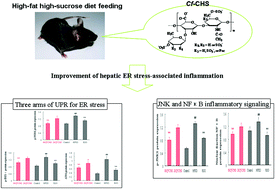Fucosylated chondroitin sulphate from Cusumaria frondosa mitigates hepatic endoplasmic reticulum stress and inflammation in insulin resistant mice
Abstract
Endoplasmic reticulum (ER) stress-associated inflammation positively contributes to insulin resistance. It is also known that fucosylated chondroitin sulphate from Cusumaria frondosa (Cf-CHS) can mitigate insulin resistance; however, its effects on ER stress and inflammation are not well understood. Therefore, we investigated whether Cf-CHS-influenced ER stress, inflammatory response and signaling in insulin-resistant mice. Our results showed that Cf-CHS lowered serum and hepatic ROS, NO, and FFA levels. Furthermore, Cf-CHS decreased serum proinflammatory cytokines TNF-α, CRP, MIP-1, IL-1β and IL-6 concentrations as well as their hepatic mRNA expression, and increased the anti-inflammatory cytokine IL-10 levels. Moreover, Cf-CHS reduced the ER stress markers Bip, ATF6, PERK, and XBP1 mRNA or protein expression, and PERK, eIF2α, and IRE1α phosphorylation. These reductions were accompanied by a reduced activation of JNK1 and IKKβ, NFκB nuclear translocation, and IR/IRS-2 serine phosphorylation in Cf-CHS-treated mice. These findings suggested that the Cf-CHS supplementary-induced alleviation of RE stress-associated inflammation could be the mechanism responsible for its beneficial effects against insulin resistance.



 Please wait while we load your content...
Please wait while we load your content...